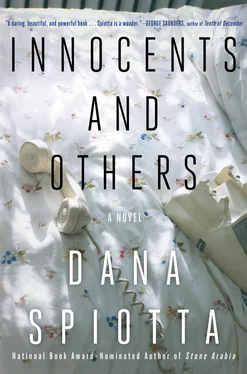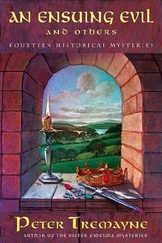“This is my favorite part,” she said. Carrie hugged her.
“I can’t wait to see how they look,” Carrie said.
“You can stay and help me, you know,” Meadow said.
“School, I have school,” she said. “And Will.”
“Yeah, I know.”
* * *
In the end, the Alice Guy-Blaché reenactments were indeed wonderful: beautiful, old in feeling rather than in cliché representations of “old.” The films had some relationship to Guy-Blaché’s titles, but they also had evidence of Meadow and Carrie’s noticing everywhere. Kubrick and the found music and a summer in Gloversville. Reimaginings rather than reenactments, they had found a way to collaborate with the history of cinema.
The Western reenactments, however, were as bad as Meadow feared: silly, obvious, and smug. The idea never went anywhere unexpected. Meadow had hoped that you would move to a different place once you got the initial joke. But it didn’t happen. She couldn’t make it interesting in editing, because the concept was to replicate the editing of the original films. Formally it felt too schematic and dull, and she couldn’t think of it as anything but an exercise. Meadow grew frustrated with all of it. She quit doing anything movie-related for three weeks. She slept late and then lay on the couch and read the paper. So bored was Meadow that she had sex with Deke three times a day.
“What’s wrong?” Deke asked. She shrugged him off. At the end of the three weeks, she woke up and went for a long run. She ran through Gloversville until the main street suddenly gave way to farmland. She could see the long view of the horizon where the peaks of the Adirondacks were visible. She could breathe, and she could shake off all the sitting in the dark looking at shadows. Stupid, boring shadows. She ran faster until she had to stop, breathless. She bent over and waited to catch her breath. A wave started in her stomach. Her mouth moistened and she felt that she might vomit.
It sickened her. Some of her ideas would fail no matter how hard she worked. She couldn’t always figure it out ahead of time. She could fail.
Will’s band was the second to last to go on. It would be midnight before the set started. Carrie waited, sipping a beer at the bar, trying to bide her time.
“This is Carrie. Carrie, this is Mike,” said Will. All night he had introduced her to his music friends. She had been with Will for months, and still there were new friends to meet. They were at a place called Enid’s in Greenpoint, and everyone knew Will. They looked at her closely, not unkindly, as though they thought it was great that Will had found someone. Will was six years older than Carrie, and he hadn’t had a serious girlfriend since a big breakup three years ago. Despite being in a band, he was not rock-star handsome. He was a little heavy, and he was losing his hair. Carrie didn’t find him attractive at first, but he quickly grew on her. He was very funny, and, most appealingly, he was attracted to her, every inch of her. The more she knew Will, the sexier he became.
They had met when she was the crew for a short film made by her college classmate Lindsay. They all worked crew on one another’s projects. Will was a friend of Lindsay’s, and she had recruited him to act. He was really good, playing a kind of savvy loser, a role Will was born to play. Carrie and Will talked about music. Or rather he mentioned his band rather proudly, and Carrie told him she preferred opera and musicals. He invited her to a gig, and she surprised herself by showing up and even dancing a little. She bought all three of the band’s albums (released on a local indie label, but released), and she listened carefully to each one. Will was an accomplished songwriter, witty and poetic. But the thing she loved best about Will, what really struck her, was his lack of indifference. So many guys she met were cool and, well, uninterested. She always felt she had to hide her enthusiasm. Carrie just fell in love with people, that was her way. She knew it frightened men. Will: not frightened. Will met her enthusiasm and exceeded it. For instance, he collected vintage ephemera, and he would write her long notes in black ink on old ads or toy packaging that ironically played off whatever he wrote in his note. She soon had a collection of love notes, and all together they looked of a piece, like an art project.
Carrie drank her beer and congratulated herself on her own instincts. She never understood the appeal of unrequited love. It was much healthier to love someone who loved you back. She liked being attended to. He called her every day. He met her after class and walked her home. He bought her dinner (albeit at a cheap Polish diner, but still). And after they spent a few weeks together, they both declared themselves in love. Loving Will made Carrie feel happy. Now she didn’t have to worry or guess. She had Will.
The band finally went on at 12:45. Carrie rallied herself, and Will dedicated a song to her. They went back to his place, a one-bedroom railroad walk-up. In the winter, it was either freezing or way overheated from the clanking steam heat. When she complained, Will sang, “Oh my California baby,” which was part of a song he had written for her. But the apartment — god. It had mice and was very dark. There were gates on the five windows: three in the bedroom and two small ones in the kitchen that went to the fire escape. It was spacious, but the space was awkward. The middle “living room” section was full of band gear. She thought it funny that they both had so much gear; so much stuff was needed.
Will made her a late meal of a hamburger with a glass of red wine. He handed her a wrapped box.
“What’s this?” Carrie said, the first bite of food waking her and making her suddenly hungry.
“A birthday present,” he said.
“My birthday is two months from now.”
“A Saturday night present, then.”
She unwrapped the small felt box. Inside was a clear plastic heart on a chain. The heart had bent gold wire embedded in it that spelled the word Sweetheart.
“Oh,” she said.
“Do you know what it is?” Will asked.
“It looks antique,” she said.
“It’s a piece of sweetheart jewelry from World War II. The Lucite heart is made from the windshield of a fighter plane. Handmade. Some soldier made it for his girl back home so she would remember him. Like trench art and love tokens.”
Carrie put it on. “I love it.”
Will smiled. “I will get you more.”
“Thank you,” she said, and leaned over to kiss him.
In the morning she picked up the heart from the side table and watched it spin on its chain. She pulled the chain over her head and felt it bump against her breasts as she moved. When she got back to her apartment, she hung it over her desk so she would see it every day as a reminder of how strong love and longing could be. Someone made this by hand for his love as he waited for whatever fate held for him. He was far away but their love would endure. People need forget-me-nots and mementos so they remember they are loved.
But the opposite idea was true too. That all love ends. Why was Will able to buy this cherished object, this marker of some long-past connection between two people, in an antiques store? At some point there had to be an ending, a death or a breakup, and it got tossed in a box to be given away or sold.
Meadow’s desire to make a film returned to her as she and Deke sat up one night. They’d had a couple of drinks, and Deke was smoking a cigarette. Young Deke was such a beauty that sometimes it was hard to hear what he said because his prettiness upstaged him. But talk he did: one of Deke’s characteristics was to be quiet and retiring during the sober light of day and to transform, Mr. Hyde — like, in the night. Meadow liked him this way: unspooling and unable to hold back as he told her everything about his young life. He smoked and drank and added another clause to a long endless string. Deke had a voice she liked to listen to, a face she liked to watch. After an hour of watching and listening (in-and-out listening, looking really), Meadow started to film him. Just picked up her camera and shot a three-minute silent film of him as he talked.
Читать дальше












